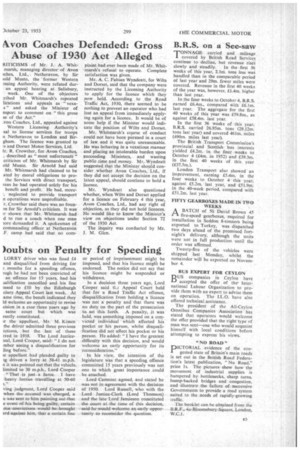)oubts on Penalty for Speeding
Page 39

If you've noticed an error in this article please click here to report it so we can fix it.
LORRY driver who was fined £4 and disqualified from driving for months for a speeding offence, nigh he had not been convicted of an offence for 15 years, had his Jalification cancelled and his fine :ased to £10 by the Edinburgh ciary Appeal Court last week. At ame time, the bench indicated they Id welcome an opportunity to revise cision in a case three years ago by same court but which was rently constituted.
nthe appellant, Mr. M. Kissen the driver admitted three previous ictions, but the last of these
rred in 1938. The Lord Justice:rat, Lord Cooper, said: "I do not mber seeing a disqualification for ling before."
te appellant had pleaded guilty to ig driven a lorry at 38-41 m.p.h. a it was pointed out that the vehicle. limited to 30 m.p.h., Lord Cooper 'That is just-a farce, I have heavy lorries travelling at 50-60 viag judgment, Lord Cooper said when the accused was charged, a c was sent to him pointing out that e event of his being guilty, certain ous 'convictions would be brought and against him, that a certain fine or period of imprisonment might be imposed, and that his licence miglit be endorsed. The notice did not say that his licence might be suspended or withdrawn.
In a decision three years ago, Lord Cooper said th.; Appeal Court held that for a Road Traffic Act offence, disqualification from holding a licence was not a penalty and that there was no duty on the part of the prosecution to set this forth. A penalty, it was held, was something imposed on.a con: victed individual which affected his pocket or his person, whilst disqualification did not•affect his pocket or his person. He added: "I have the greatest difficulty with this decision, and would welcome an early opportunity for its reconsideration."
In his view, the intention of the legislature was that a speeding offence committed 15 years previously was not one to which great importance could be attached.
Lord Carmont agreed, and stated he was not in agreement with the decision of 1950. Lord Russell, who with the Lord Justice-Clerk (Lord Thomson) and the late Lord Jamieson constituted the court at the time of this decision, said he would welcome an carly opportunity to reconsider the question.




































































































